Top Eco-friendly Choices: The Best Biodegradable Gloves for Every Task
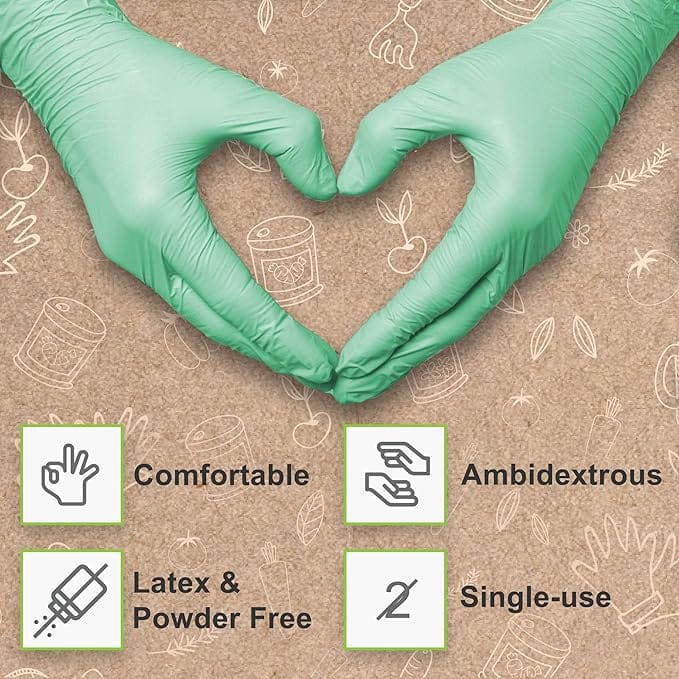
Post Covid Rise Of Disposal Glove Waste
If you’re looking to minimize your impact on the planet while keeping hygiene at the forefront, biodegradable gloves are your choice. This article explores which of these gloves are essential for eco-friendly practices. Whether for food prep, cleaning, or professional tasks, discover which disposable gloves are in fact sustainable and perform without leaving a lasting footprint.

Vinyls And Nitriles Are Not Our Friends
Plastic pollution has become an environmental crisis and it's time we start taking responsibility for our actions. One of the major contributors to this issue is the use of disposable gloves made of non-biodegradable materials like nitrile and vinyl. Hey, I get it, they may be cheap and convenient, but let me tell you why they're not your friends.
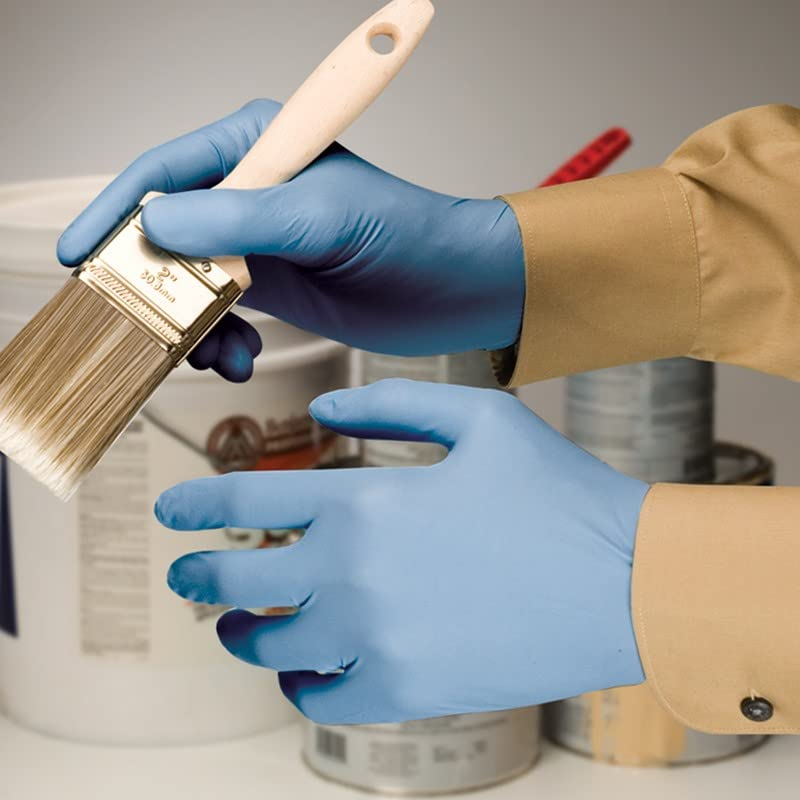
SHOWA. claims to be biodegradeable nitrile (but degrades into what?)
Nitrile gloves take centuries to fully decompose, meaning they will still be haunting the planet long after we're gone. Nitrile gloves are not only bad for the environment, but they're also bad for our health.

FifthPulse. biodegradable nitrile disposable gloves (still plastic)
Bio Nitriles Not As Eco As They Sound
They contain chemicals like acrylonitrile which can cause respiratory problems and skin irritations. Similarly, vinyl gloves contain similar harmful chemicals like phthalates that have been linked to hormonal imbalances and reproductive issues.
No Matter What Sellers Tell You
Nitriles, like vinyls, are made from toxic synthetic materials that will take centuries to break down. Methane and microplastics are among their end residuals, thus contributing to the already massive plastic pollution crisis.
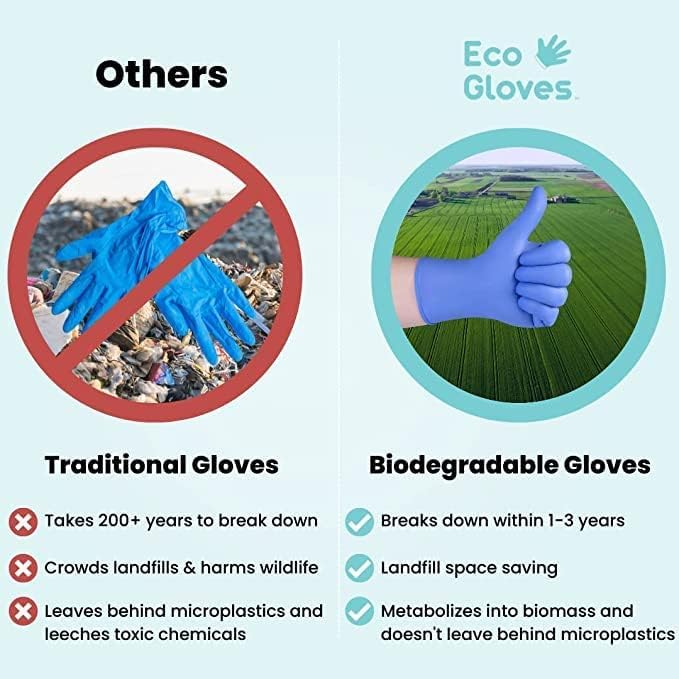
Eco Gloves. biodegradable nitrile (really? no microplastics?)
Difficult to recycle, most nitriles end up in landfills or oceans, where they can harm wildlife and ecosystems. And let's not forget about the harmful chemicals used in the production of these gloves, which can be detrimental to both the environment and our health.
Opt For Natural Materials
Ditch the plastics (including nitrile) gloves and go green! These eco-conscious alternatives to common disposable gloves are not only FDA approved for food safety, but they're also certified compostable. Plus, they have a much smaller environmental footprint since they can break down into natural compounds.

ASAP. natural latex, powder free
With a variety of types available, you can find a pair specifically designed for food prep, cleaning, medical or professional use. Most of these gloves are made from entirely plant-based polymers, offering features chemical and bacteria resistance, as well as puncture protection.
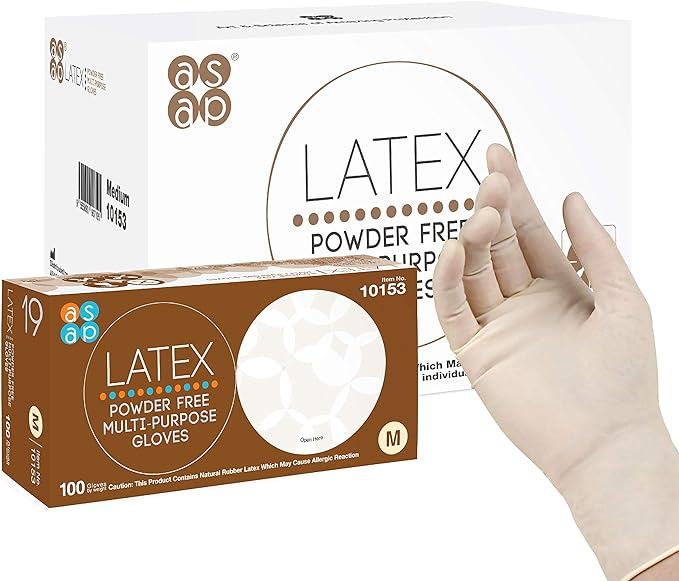
ASAP. natural rubber, no microplastics
When choosing environmentally friendly gloves, it's important to consider their intended use, the materials they're made from, and their compostability certifications. You'll also want to find the perfect balance between protection and dexterity, with the thickness of the material playing a key role in performance.

The Rise of Biodegradable Gloves
The environmental impact of disposable gloves is hard to ignore. Every year, billions of them end up in landfills, creating an environmental problem that’s growing alongside our increasing reliance on disposable items. Enter eco gloves, a beacon of hope in this challenging scenario. Crafted from plant-based biodegradable materials.
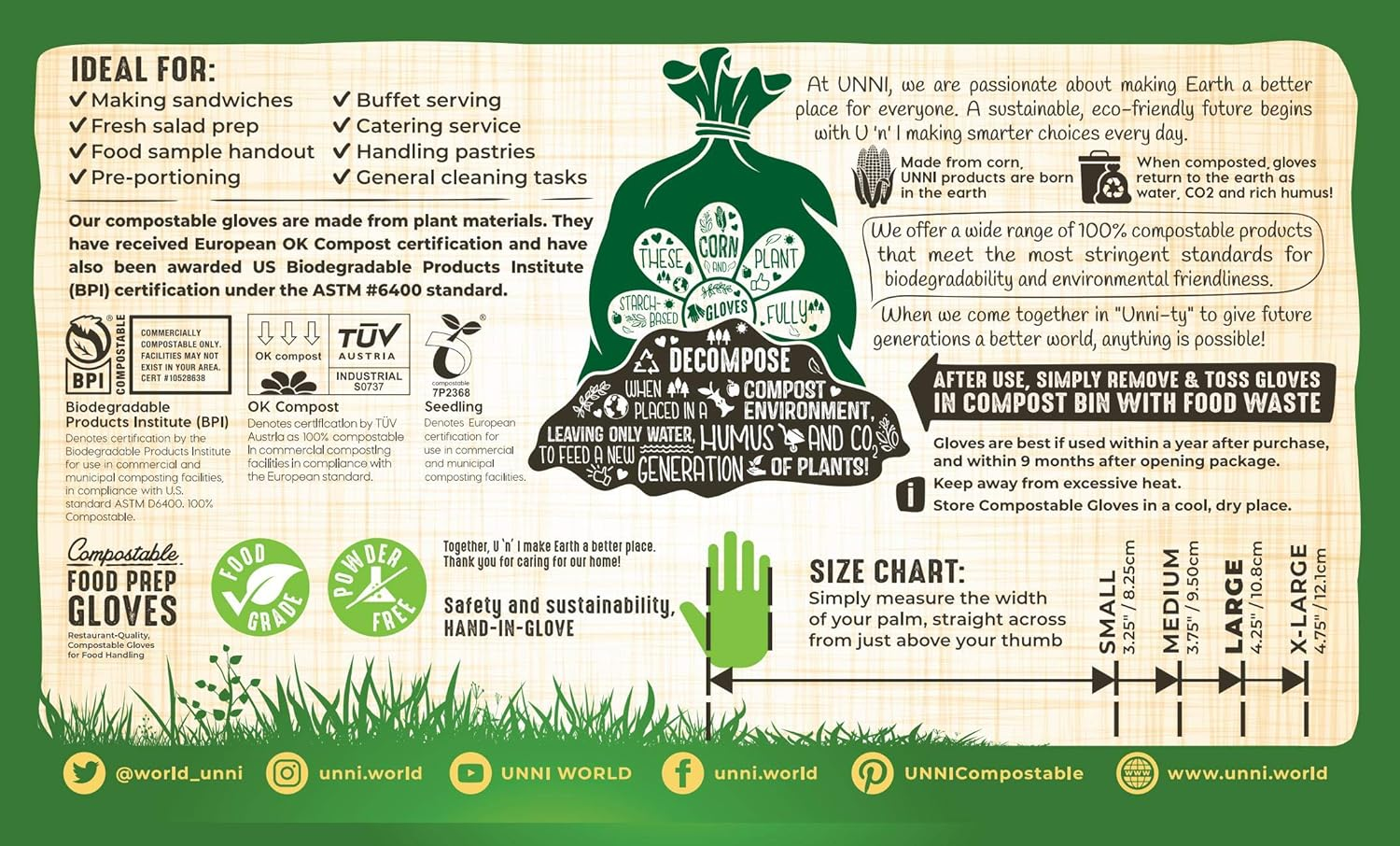
UNNI. compostable, food prep and other uses
The best eco-friendly gloves possess numerous attributes that set them apart from their traditional counterparts. They:
- Decompose into natural compounds, without toxic waste
- Are FDA-approved for food contact
- Are certified compostable
- Are free of latex and phthalates, thereby preventing the release of toxins into the environment
- Utilize technological advancements like Eco Best Technology (EBT) to significantly improve the biodegradation process of gloves, rendering them fully biodegradable and sustainable.
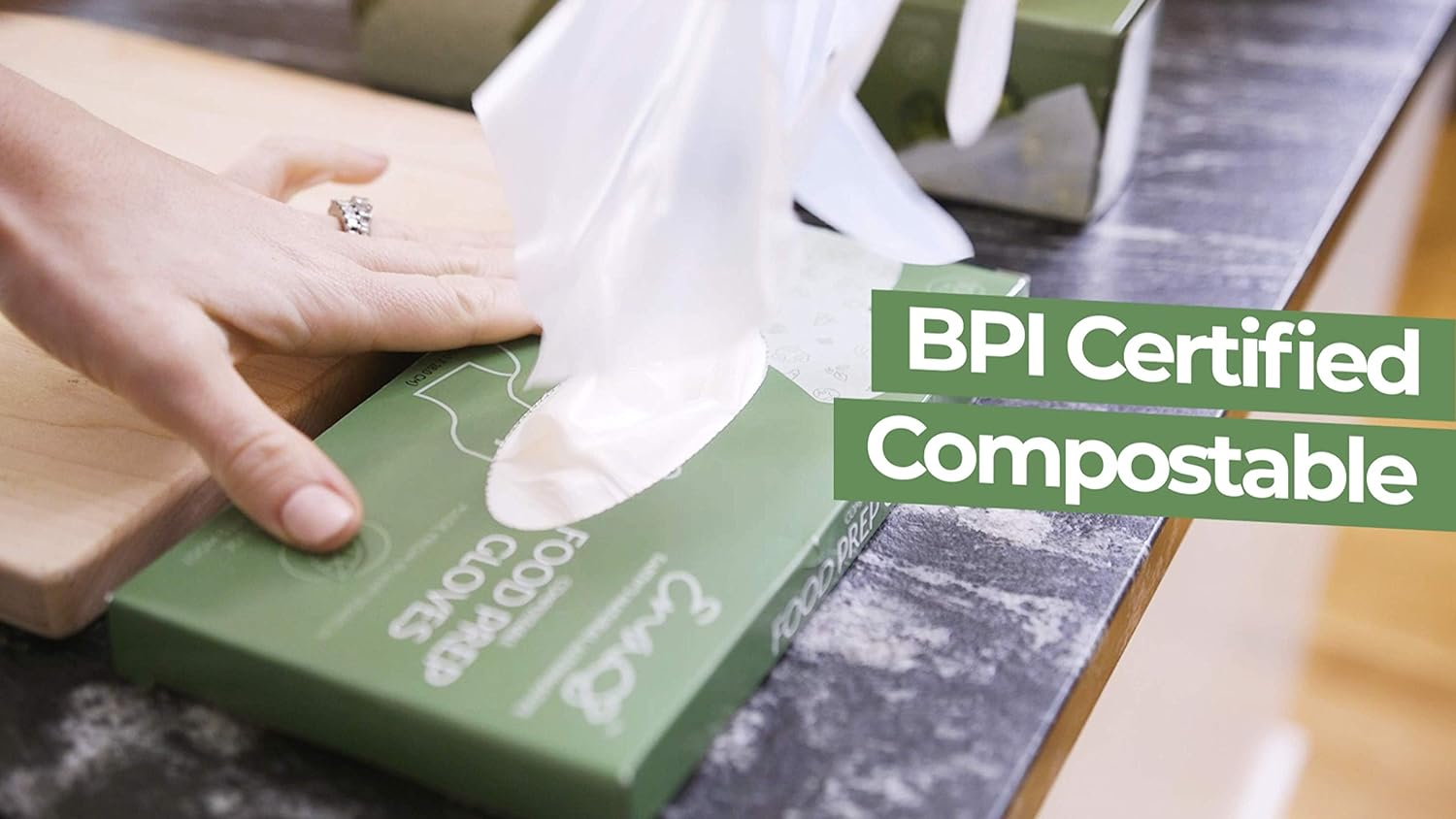
Earth's Natural Alternative Store. 100% compostable
Why Does It Matter?
What makes biodegradable gloves so significant? The primary reason is that they offer environmental benefits by reducing waste and pollution. They are more efficient and break down quicker than non-compostable gloves, making them suitable for backyard composting, without microplastics.

LANON. plastic free
When disposed of, eco gloves decompose by breaking down and metabolizing into carbon dioxide and water over a specific period, thereby less waste and preventing long-term pollution and adding to overflowing landfills.
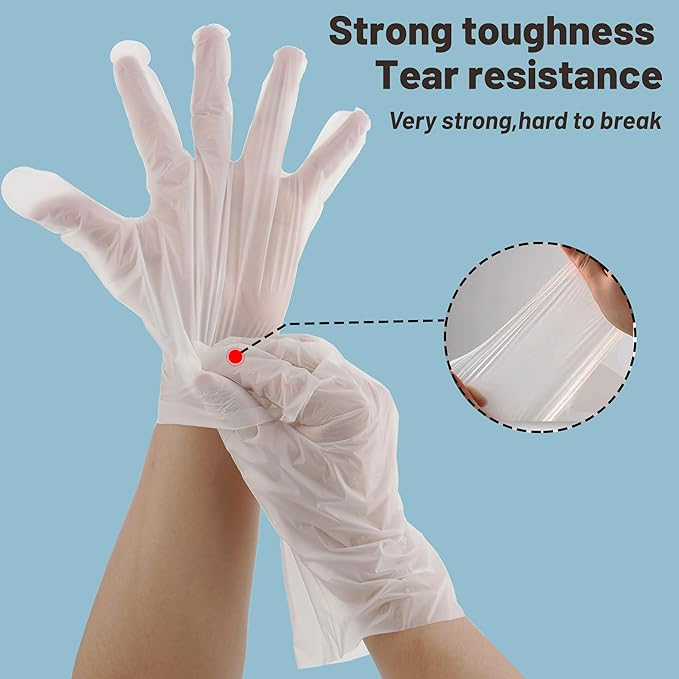
JENSENBIO. waterproof
Beyond their inherent eco-friendliness, these gloves are made to offer all the benefits of plastic without its detrimental environmental impact. Their features include:
- Decomposition period of 180 days in a compostable setting, or 18 to 24 months in a landfill
- Approved for home and industrial composting by TUV Austria
- Certified by the Biodegradable Products Institute (BPI) for environmental sustainability
These certifications ensure their environmental sustainability.
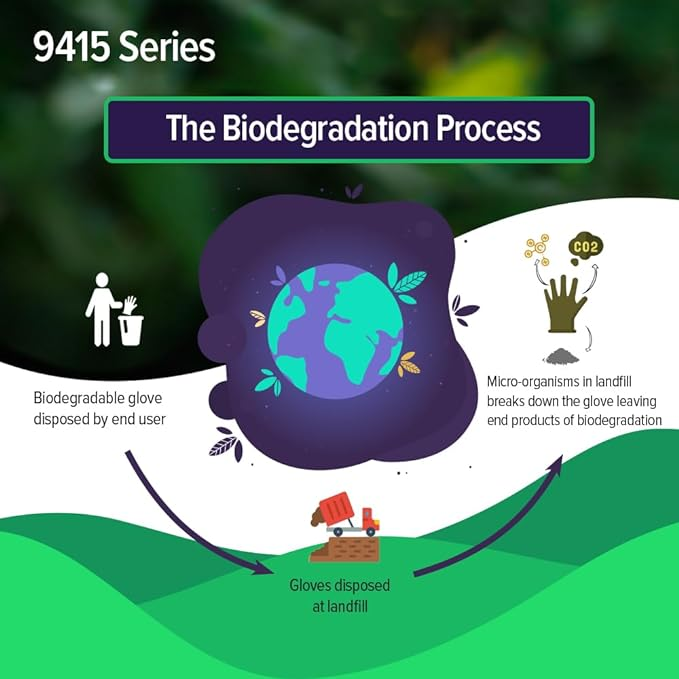
TRONEX. biodegradable nitrile (end product misrepresentation)
The Myth Of Biodegradable Nitrile
Biodegradable nitrile gloves are.... not quite as good as they sound. Makers mix in some plant based organic compounds so they may break down faster, but will still degrade into microplastics. Produced through a toxic process to form gloves composed of acrylonitrile and butadiene copolymers.
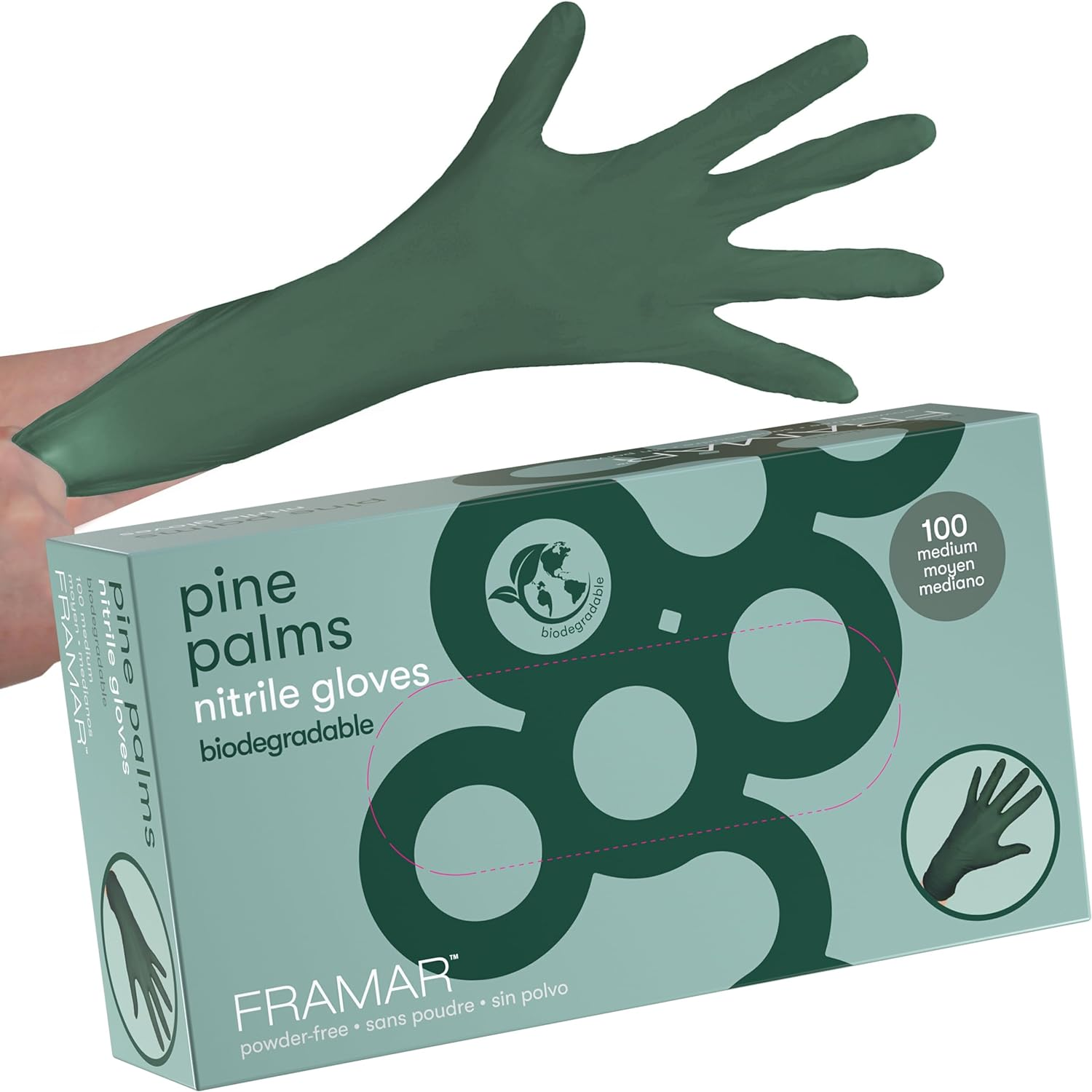
FRAMAR. biodegradable nitrile. (mostly a petrol - plastic - product)
This results in gloves that may have the flexibility and dexterity of natural latex, well-suited for tasks requiring tactile sensitivity, but with major health and environmental tradeoffs.

By contrast, compostable bio gloves typically utilize renewable or all-natural plant materials such as corn, cassava, and sugarcane, among others, Biodegradable nitrile is plastic (PVC) combined with biodegradable polymers like cornstarch and soy protein to produce latex-free gloves that are devoid of the rubber protein that causes allergies.
Top Biodegradable Gloves for Food Prep
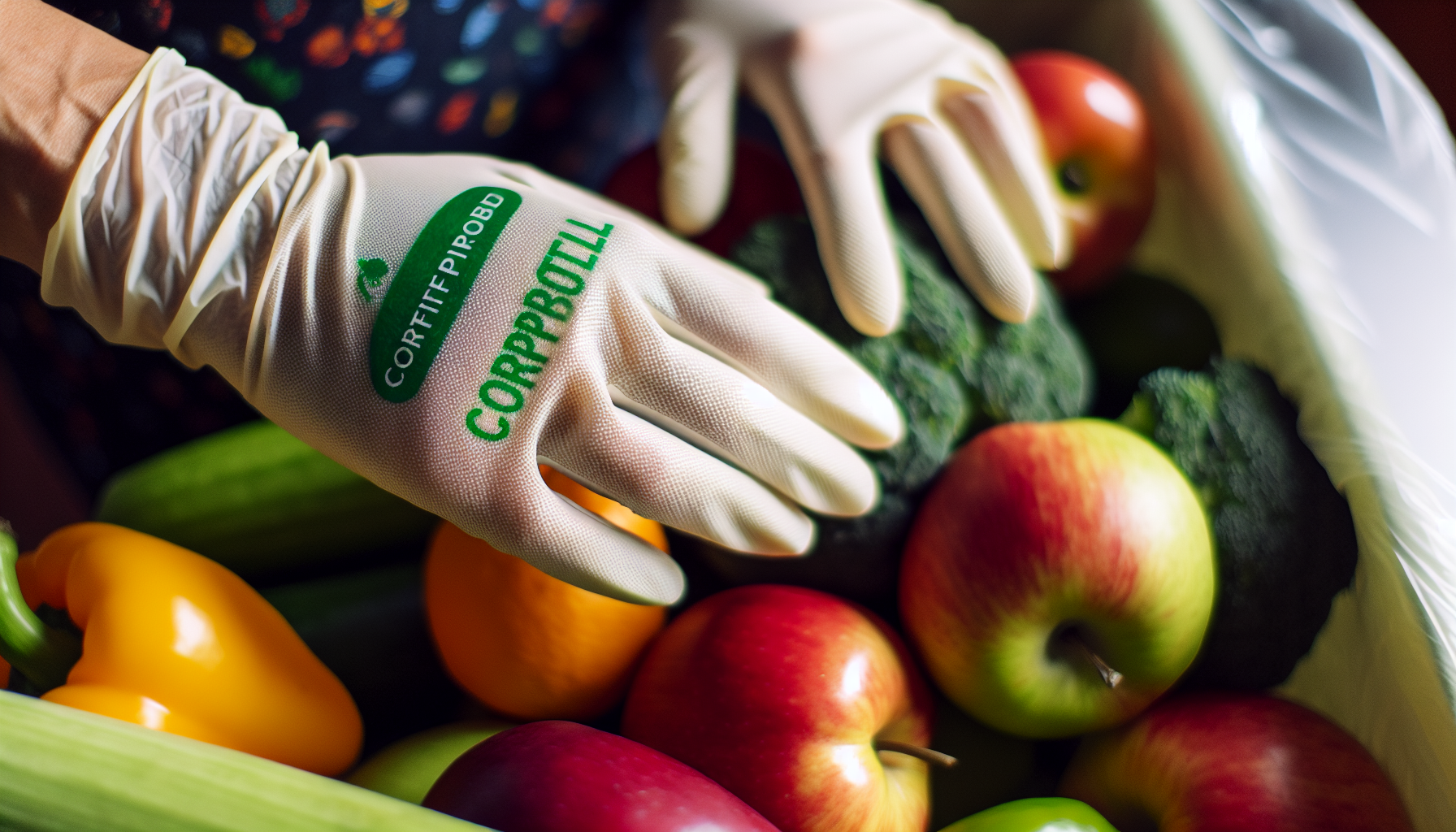
Truly Compostable Gloves
Food handling gloves are a kitchen staple, indispensable for everyone from professional chefs to home cooks due to the extensive hand contact with food involved in meal preparation. Among the various glove options available, brands making eco gloves have received FDA approval for food contact and are thus deemed food safe and suitable for food handling.
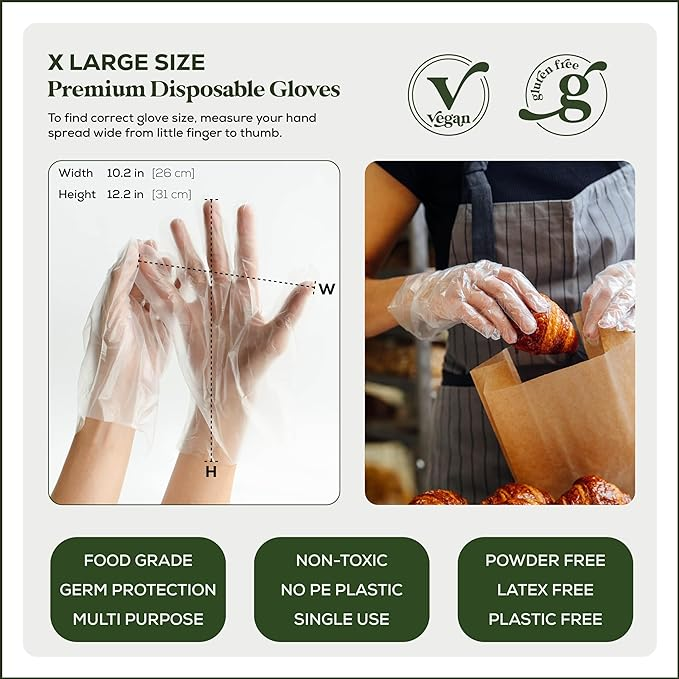
Holy Scrap! excellent company, product to packaging
Striking a perfect balance between durability, comfort, and environmental impact, these eco-friendly gloves are an ideal choice.
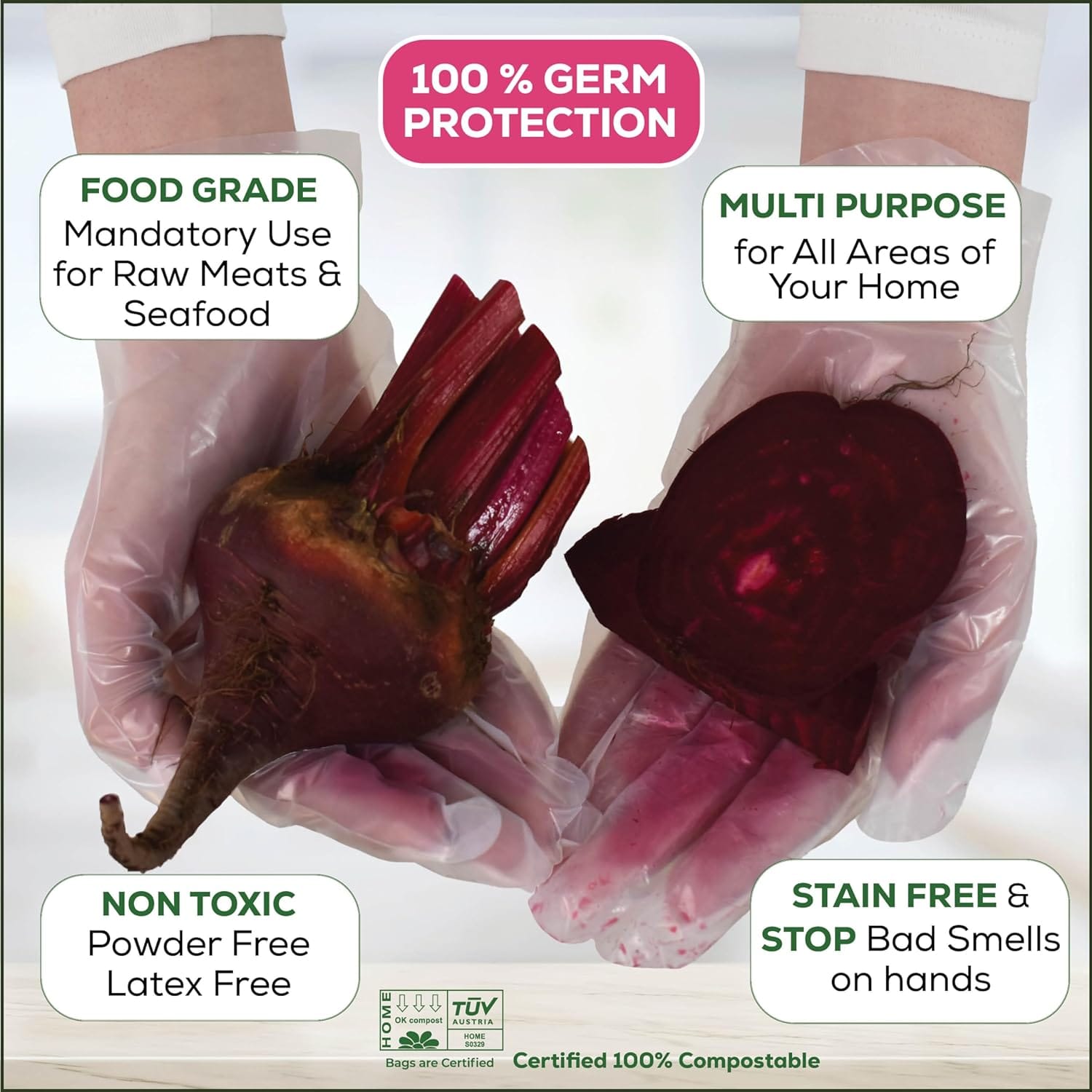
They are designed to protect your hands while preparing food and to decompose naturally once disposed of, making them a sustainable choice for any food prep task.
Compostable Food Prep Gloves
Several brands distinguish themselves in the realm of compostable food prep gloves. The recommended brands on this page are known for their high-quality gloves. These gloves are commonly made from modified corn starch or EcoVio®, which are compostable polymers.
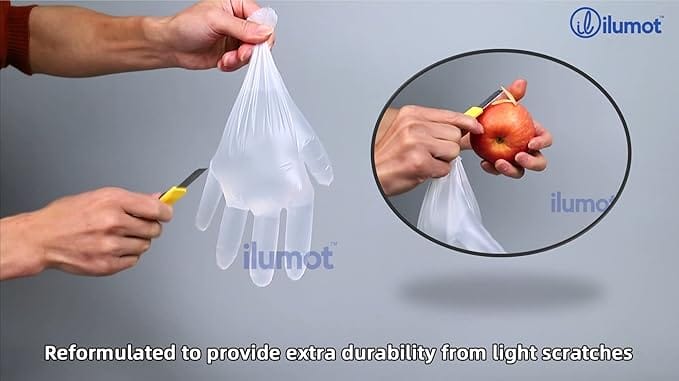
ilumot 100% plant based latex free, food grade
Eco Friendly Plant Based Gloves
The 180 Day Compostable Food Prep Disposable Gloves are:
- Constructed from modified corn starch, ensuring they are safe for food handling and environmentally friendly
- Designed to be leakproof and tear-resistant
An excellent choice for professionals in restaurant kitchens, fast food services, or sandwich making.
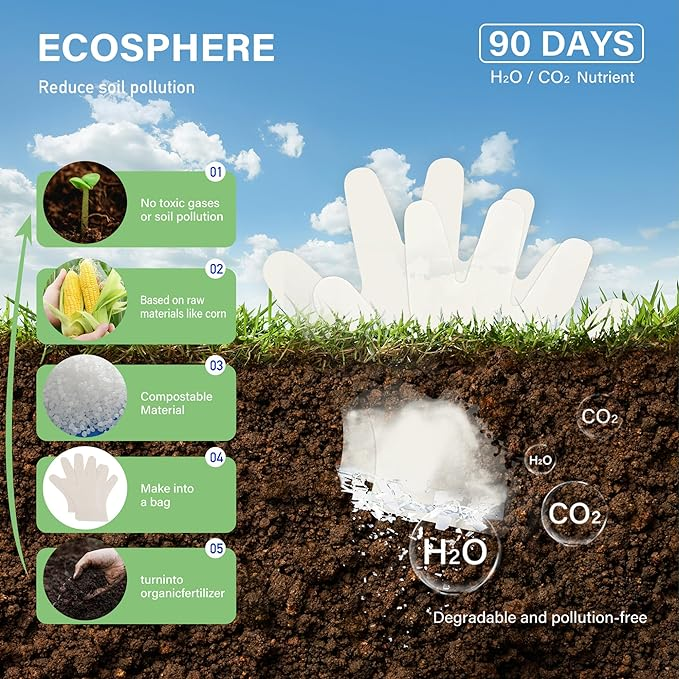
Envfender non toxic, food grade
Powder-Free Biodegradable Nitrile Disposable Gloves
While hardly non toxic, for food preparation, Powder-Free Nitrile Disposable Gloves are nevertheless promoted for use in food preparation.
A nitrile disposable glove is composed of nitrile rubber, a synthetic material touted for its supposedly unmatched comfort and resistance to certain compounds. Although debatable how eco friendly they really are, or how safe around food.
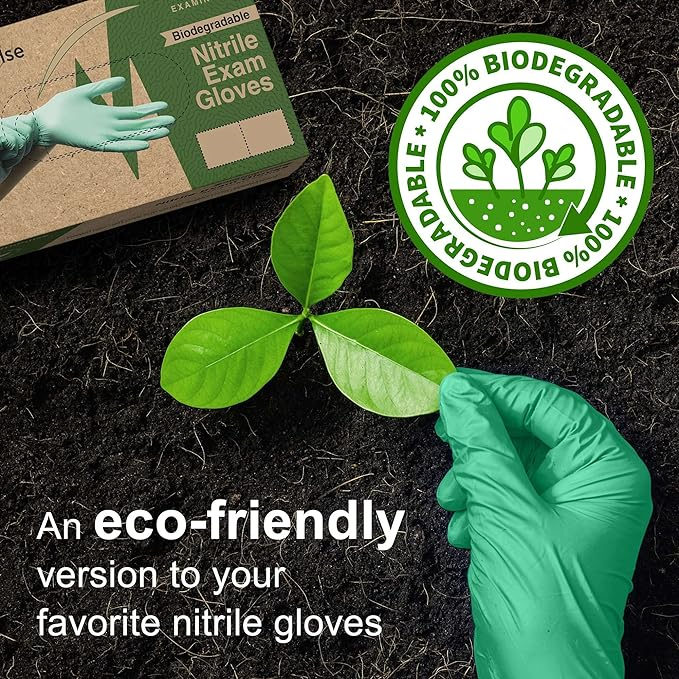
FifthPulse. nitrile disposable glove
Forget About Vinyl Glove Options
Despite the often low price of a vinyl glove, save adding more plastic waste to our landfills, And save on the added price to your health by just saying no to vinyl. Many brands are not actually putting their eco best technology forward.
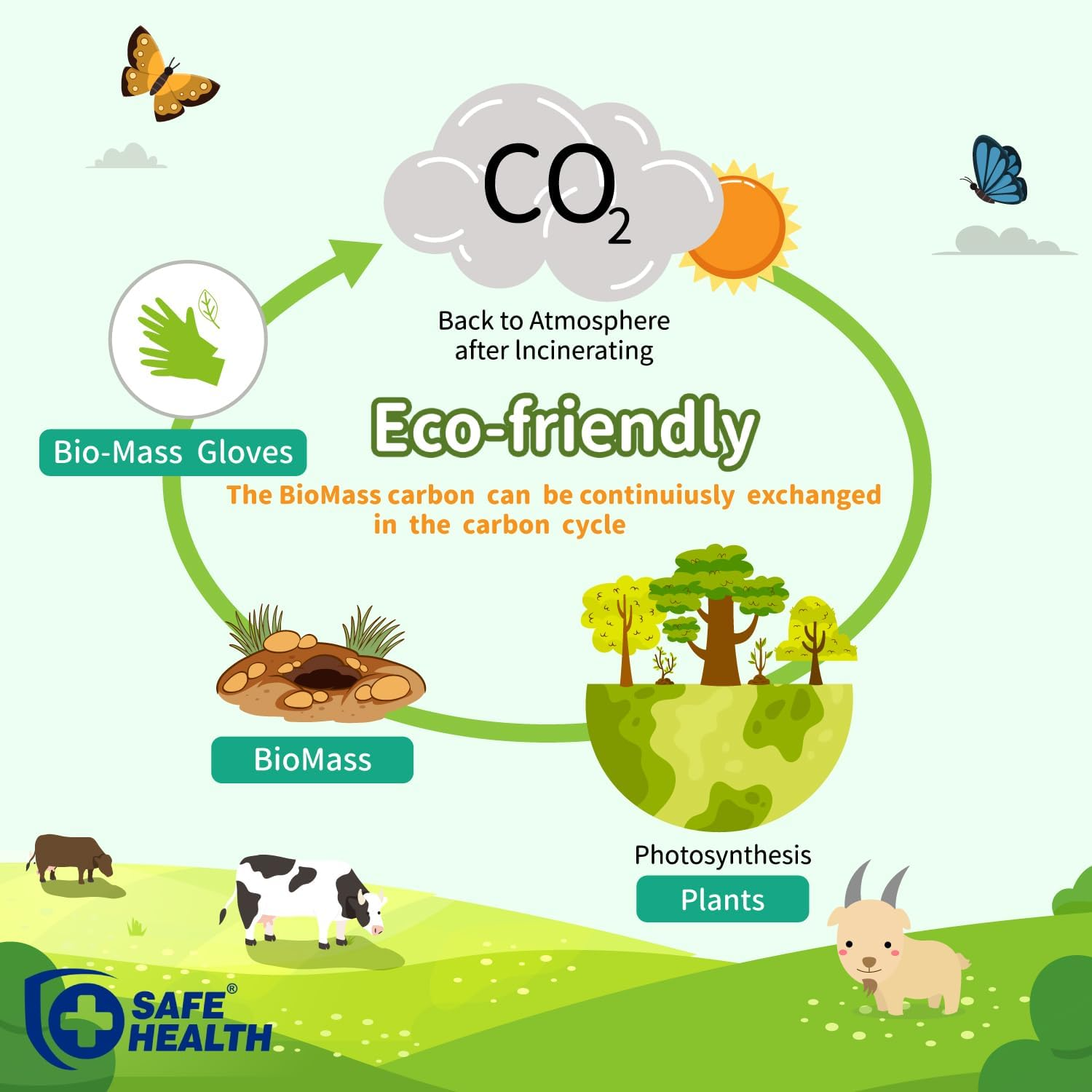
Safe Health. Another company trying to fool you into thinking they are giving you a helpful sort of plastic. The truth is... there are no helpful plastics.
Which Gloves Are Really Eco Friendly?

BeeSure company claims their nitrile gloves are eco friendly by conservation of resources and by using 80% post consumer products in their packaging.
Plastic Free Household Cleaning Products Can Be Found Here
While biodegradable nitrile gloves are typically pricier than vinyl gloves, the protection they are said to provide is surpassed only by natural latex. If allergies are not a concern, nothing beats natural rubber (latex) for puncture resistance, substantial protection against cuts and tears, and unmatched comfort.

FifthPulse. rubber
Superiority Of A Natural Rubber Glove
The characteristics of natural latex enhances their suitability for food handling and makes them a resilient option for environments involving the manipulation of tools and utensils during food preparation and cooking. And with no microplastics!
Sustainable Gloves for Cleaning and Household Tasks
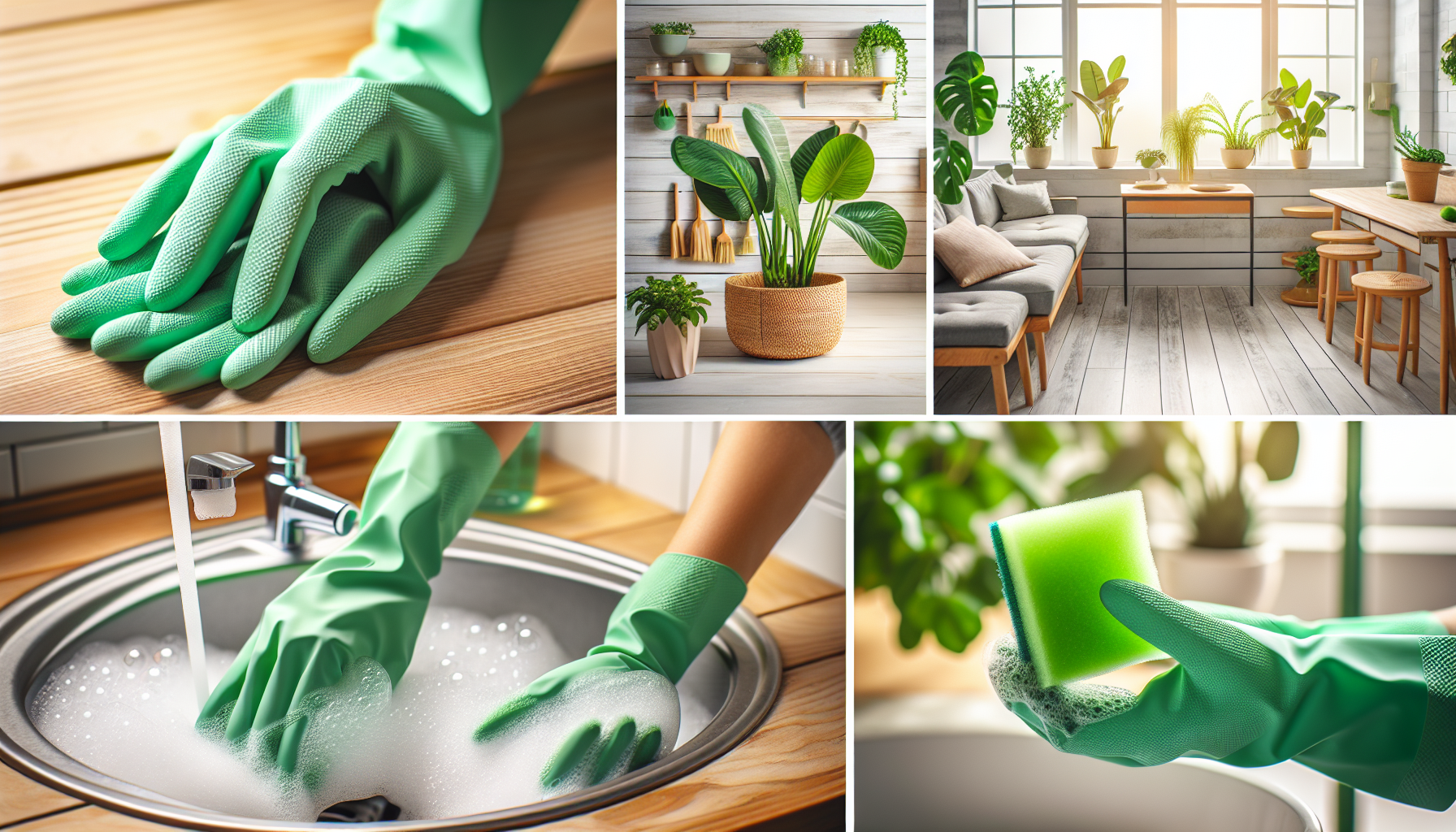
The best eco gloves extend their sustainability beyond food preparation to cleaning and other household chores. They are typically composed of renewable, plant-based resources, which helps in reducing environmental waste impact.
For Plastic Free Dish Soap & Sponges Go Here

GripProject ultra thick and soft, more environmentally friendly than synthetic rubber or plastic gloves.
However, it’s important to note that these gloves may not be suitable for all cleaning tasks. Tasks involving some acids or solvents can cause degradation of the gloves over time. But hey, that's why they're disposable, right?
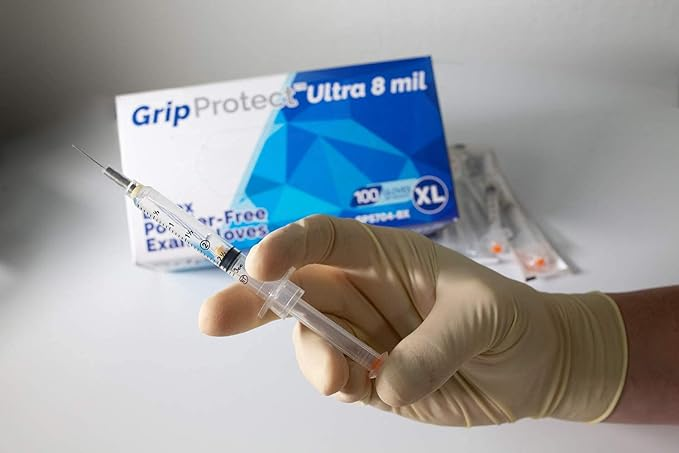
GripProtect. natural rubber gloves
While the benefit of nitrile gloves is primarily their hypoallergenic quality, the health risks and environmental plastic waste produced should be acknowledged. While "new and improved" nitriles are designed to decompose quickly, they may still take several years to fully biodegrade, emitting methane, microplastics and harmful substances that can adversely impact all life, especially marine life.
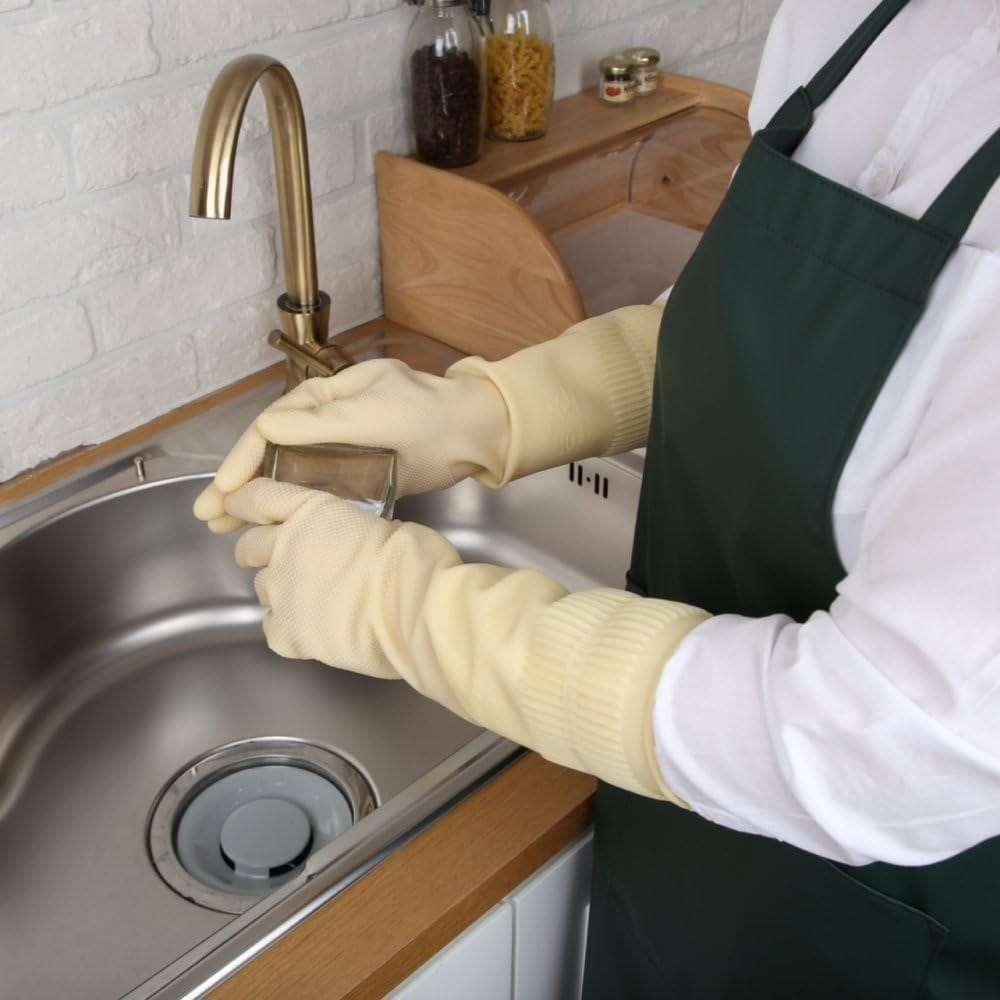
Myungjin 100% natural rubber
For Plastic Free Dish Soap and Sponges Go Here
Latex Allergies
For those with allergies or sensitivities to latex, biodegradable nitrile gloves can offer a comfortable alternative. Void of the irritant protein found in natural rubber that causes contact dermatitis, or latex allergy. But if you are not among the 4% of people, globally, sensitive to this allergen protein, then natural rubber or fully compostable is a far better disposable glove option.
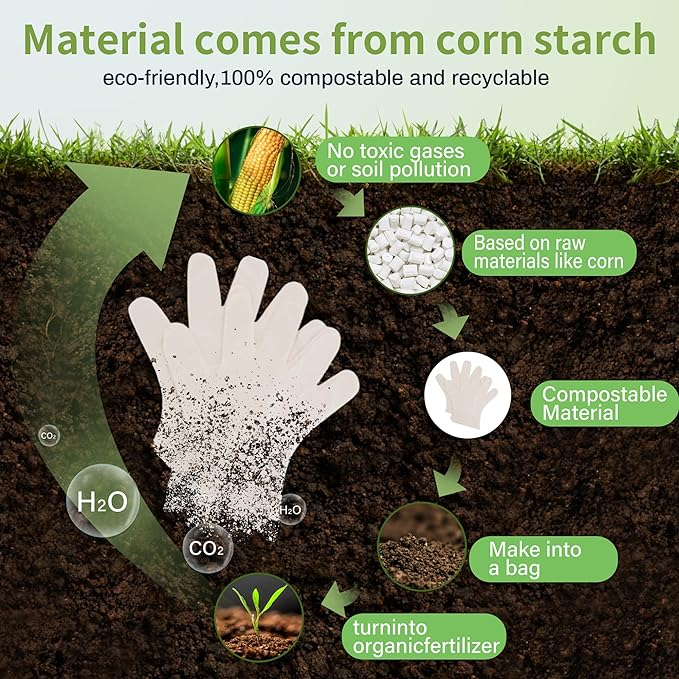
Eargardin. eco friendly gloves, compostable, food prep
Latex-Free Compostable Gloves
Manufactured using plant-based biodegradable materials, these gloves offer an environmentally friendly option that decomposes quickly when disposed of properly. They are suitable for individuals with latex allergies and provide greater comfort and flexibility compared to vinyl gloves. Additionally, they are more durable and cost-effective, making them a popular choice for many.
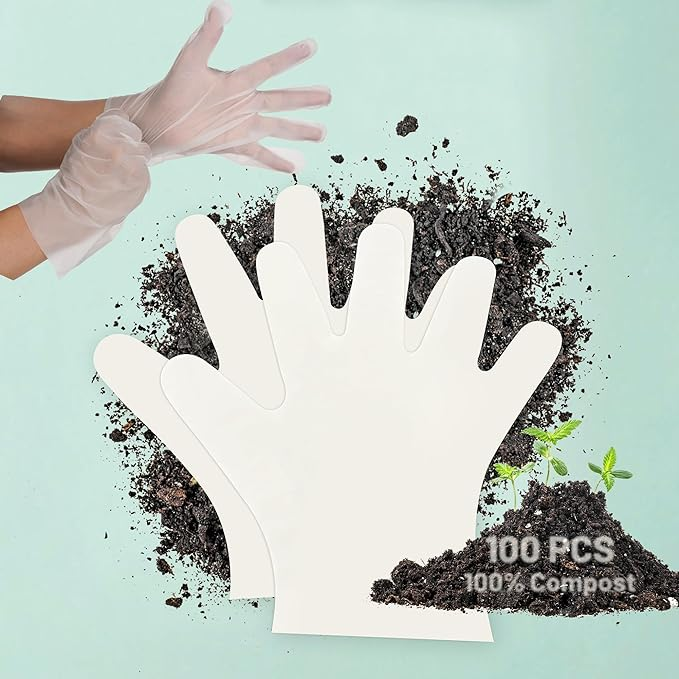
BPA-Free Eco Gloves
Another eco-friendly option for cleaning tasks is BPA-free eco gloves. These eco gloves are manufactured without Bisphenol A (BPA) and are composed of compostable, biodegradable, and plant-based materials.
BPA, a chemical associated with a range of health concerns such as infertility, obesity, heart disease, type 2 diabetes, and cancer, has the ability to contaminate food, beverages, air, and soil. It also accumulates in human tissues and organs, underscoring the importance of BPA-free products for maintaining health.
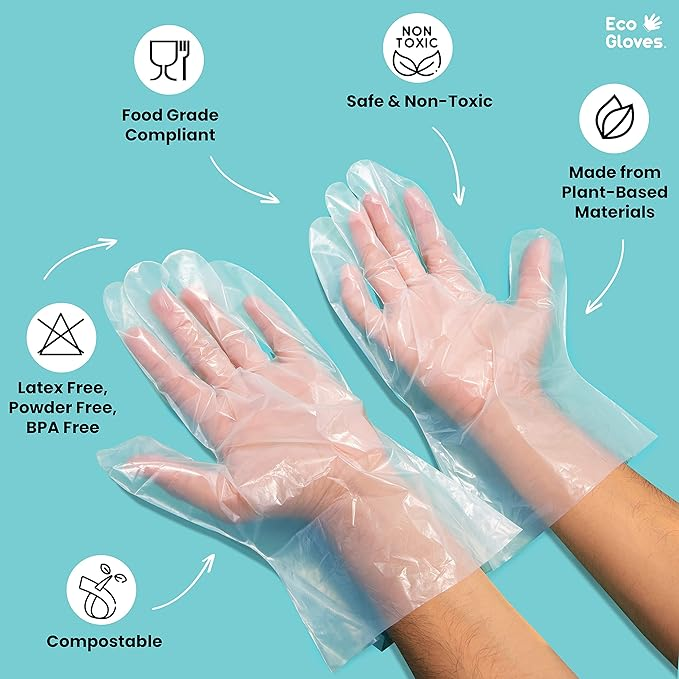
BPA-Free Eco Gloves offer a safer alternative for hand protection by eliminating harmful chemicals such as BPA, BPS, PVC, heavy metals, and avoiding the inclusion of latex, powder, or fragrance, making them suitable for eco-conscious and health-aware individuals.
Certified Compostable Gloves for Professional Use

Certified compostable gloves are a fitting choice for professional use. Designed for professional use in various industries, these gloves are crafted using annually renewable materials.
They are required to meet standards such as ASTM and EN Compostable Standards, which involve rigorous testing for biodegradability and disintegration in a controlled laboratory environment. Certification provided by organizations like the Biodegradable Products Institute.

These gloves are not only eco-friendly but also practical for professional use. In some conditions they may take approximately 2.5 years to decompose, a significantly faster rate compared to traditional plastic-based gloves. And without leaving toxic or microplastic residue.
Making the Switch: How to Choose the Right Biodegradable Gloves
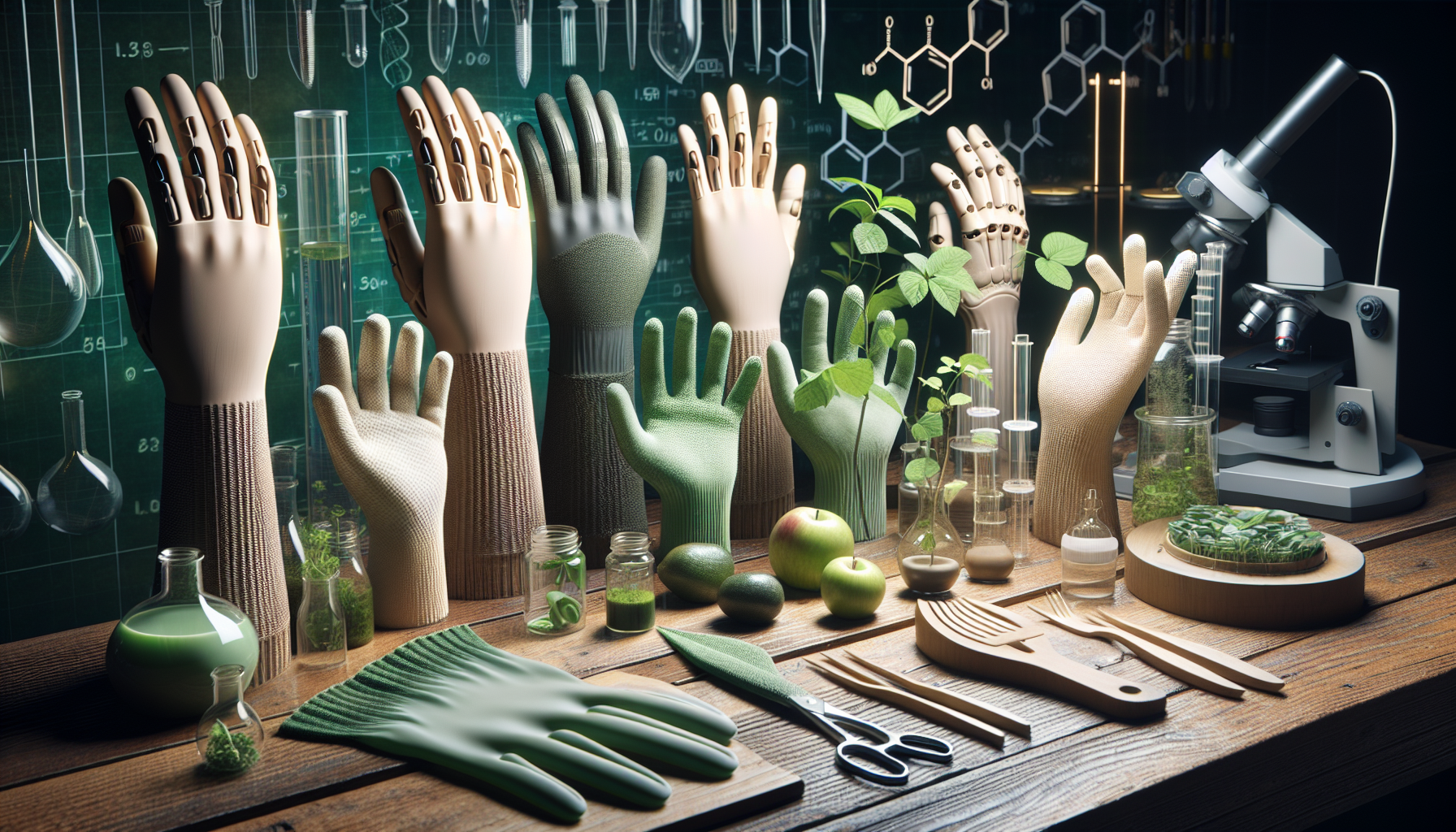
The performance of compostable gloves is largely dictated by their thickness, with thicker variants offering better protection against cuts, scrapes, and punctures. While thicker gloves offer enhanced protection, they may also result in reduced dexterity and increased bulkiness during use.
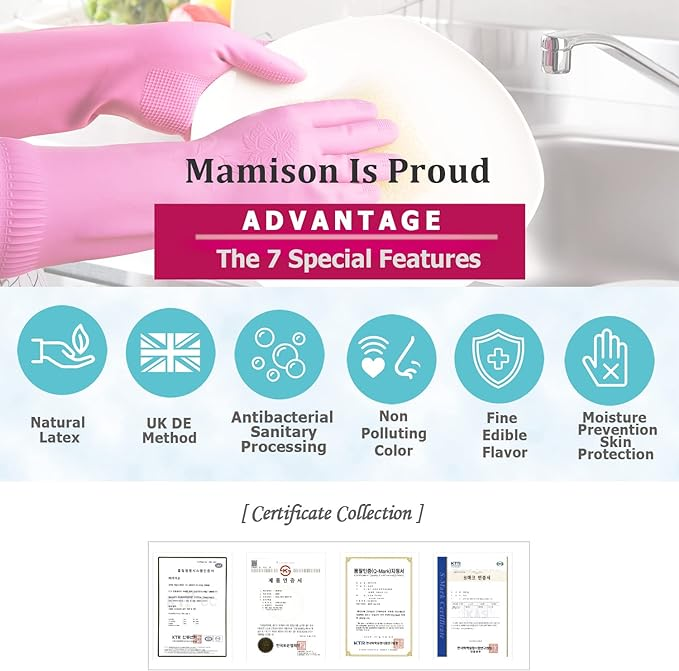
MAMISON. natural eco friendly gloves
The performance of compostable gloves is largely dictated by their thickness, with thicker variants offering better protection against cuts, scrapes, and punctures. While thicker gloves offer enhanced protection, they may also result in reduced dexterity and increased bulkiness during use.
Material Considerations
When transitioning to eco gloves, the material composition is a key factor to consider. The primary materials typically utilized in a compostable disposable glove. Plant-based gloves are made to fully biodegrade, in contrast to synthetic rubber gloves.
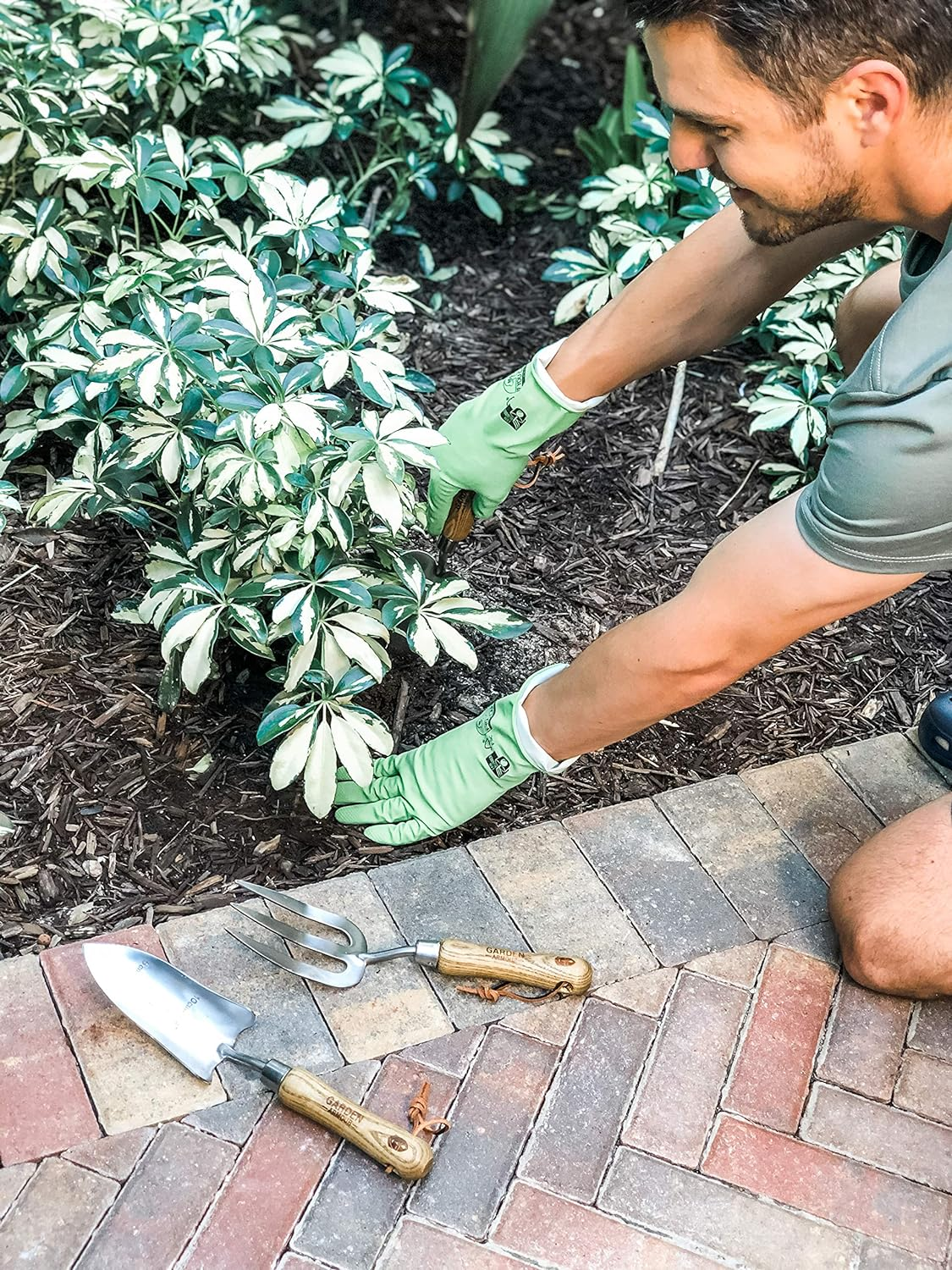
If You Care. natural latex rubber
To verify the biodegradability of a glove, it is subjected to rigorous testing in a controlled laboratory environment. The material undergoes exposure to various processes to determine its biodegradation. One widely used test for this purpose is ASTM D6400, which is specifically designed to assess and certify gloves as compostable.
Thickness and Durability
Along with material, the thickness and durability of the gloves are also important considerations. The thickness of eco gloves has a direct impact on their performance. Thicker gloves offer enhanced protection against cuts, scrapes, and punctures, but they may also result in reduced dexterity due to their bulkiness.

Full Circle. natural latex, with extra splash control
The durability and lifespan of compostable gloves are influenced by various factors, including storage conditions, air, and moisture. These gloves are designed to be strong and durable during use, but they are also intended to break down post-disposal, which can shorten their overall lifespan.
Eco Best Technology
While Eco Best Technology (EBT) is still in it's infancy as a method in determining the biodegradability of nitrile. And in no way guarantees microplastics will not enter the environment. The rise of zero waste gloves represents a significant step towards a more sustainable future.

FifthPulse. natural rubber
Whether you’re a professional chef, a cleaning expert, or a conscious consumer, there’s a biodegradable glove that’s perfect for you. And a good idea to look for a Biodegradable Products Institute (BPI) stamp of approval.
The next time you reach for a pair of disposable gloves, consider making the eco-friendly switch - a choice that benefits you and the environment. Spare a landfill of one less plastic glove burden.
When done you can toss your eco gloves in a Plastic Free Garbage Bag!
FAQs
What are compostable gloves made of?
Truly compostable gloves leave no petrol chemical or particle residue and are made of plant-based materials such as bamboo, corn, or sugarcane fiber, providing a sustainable and environmentally friendly option for hand protection.
Why do biodegradable gloves matter?
Biodegradable gloves matter in a world drowning in plastic pollution. They offer true environmental benefits by reducing that toxic waste. The best break down efficiently, leave no toxic residue, making them suitable for backyard composting.
Are biodegradable nitrile gloves really a sustainable solution for the environment?
The term "biodegradable". It's thrown around a lot these days, but without proper regulation and testing, it can be a bit meaningless. In fact, some biodegradable plastics can take just as long to break down as regular plastics, or require specific commercial composting conditions that may not be readily available.
But even if the nitrile actually does degrade in a timely fashion, it still releases harmful chemicals, greenhouse gases and microplastics into the environment. These tiny particles are ingested by marine life, leading to all sorts of health problems. And let's not forget that the production of biodegradable nitrile still requires fossil fuels, contributing to carbon emissions and climate change.
So, while it may seem like a step in the right direction, biodegradable nitrile is still far from being a perfect solution. We need to invest in true sustainable alternatives and reduce our reliance on single-use plastics altogether. Plus demand actual plastic collection infrastructure and recycling facilities, which currently does not exist.
For more information:








